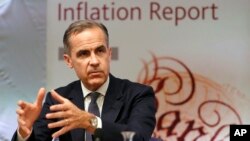Britain’s economy slowed sharply in the first three months of 2017 as higher inflation, boosted by last year’s Brexit vote, hit spending on the high street and hurt other consumer-focused businesses.
With the country heading for an election June 8, there were other signs Friday of a slowdown in the economy as house prices fell for a second month and measures of consumer confidence fell.
The Office for National Statistics said growth in the overall economy weakened to a one-year low of 0.3 percent in the January-March period from 0.7 percent in the last three months of 2016.
That represented a sharper slowdown in the rate of quarterly gross domestic product growth than the drop to 0.4 percent forecast by economists in a Reuters poll.
Last year, on par with Germany
Last year, Britain vied with Germany to be the fastest growing of the world’s major advanced economies with annual growth of 1.8 percent, defying widespread predictions of recession after the vote to leave the European Union.
But Friday’s figures are the clearest sign so far that the country is slowing in the run-up to the early election called by Prime Minister Theresa May.
British finance minister Philip Hammond said the economy remained resilient.
Fair to blame Brexit
But Alan Clarke, an economist at Scotiabank, said he expected it would slow further in the coming months.
“This weakness is likely to be blamed on Brexit. That is probably fair,” Clarke said, citing higher inflation.
“We see the trough in growth at 0.2 percent quarter-on-quarter towards the end of this year, when the squeeze from inflation is at its most intense,” he added.
The June 2016 Brexit vote led to a big fall in the value of sterling, which is now starting to push up inflation and eat into consumers’ disposable income.
The ONS said the biggest drag to first-quarter growth came from retailers and hotels, which had been hurt by higher prices.
Official data last week showed the biggest quarterly fall in retail sales since 2010.
Consumer price inflation is rising at its fastest since September 2013 as companies pass on increased costs caused by sterling’s slide in value since the Brexit vote, and many economists expect it to hit 3 percent later this year.
Despite the pick-up in inflation, the Bank of England is widely expected to keep interest rates at their record low of 0.25 percent as it waits to see the full impact of Brexit on the country’s economy.











